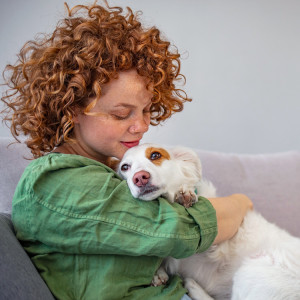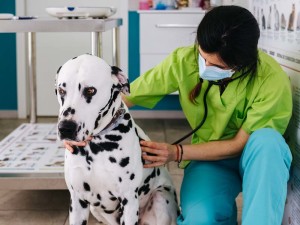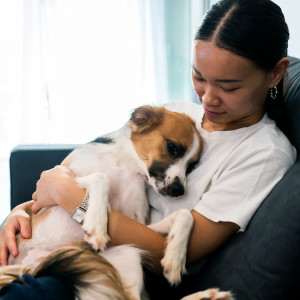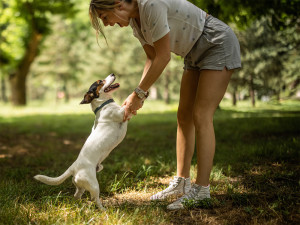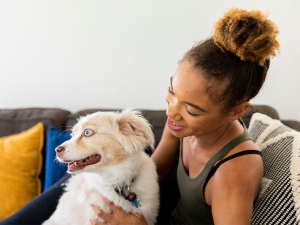Can Dogs Get a Stomach Bug?
No one likes it when their tummy hurts.

Share Article
In This Article:
What is a Stomach Bug in Dogs? Can Dogs Get Human Stomach Bugs? Symptoms of Stomach Bugs in Dogs Dog Stomach Bug Treatment Frequently Asked Questions
Dogs can develop just about any type of ailment that people can. This includes getting the occasional “stomach bug,” vomiting, or diarrhea that is acute and short lived, but can be quite unpleasant for those couple of days.
Stomach bugs can be caused from a variety of reasons, such as viral or bacterial infections. However, we can sometimes see gastrointestinal upset for other common reasons in dogs. Learn more about stomach bug causes, symptoms, and some treatment options to get your best friend feeling better quickly.
What is a stomach bug in dogs?
A “stomach bug” is a term typically used to describe acute (or sudden) gastrointestinal symptoms caused by a variety of different causes in dogs. Commonly, dogs can contract viruses or bacterial infections, which can cause sudden and short-term symptoms in dogs, such as vomiting, diarrhea, and loss of appetite. Dogs can also pick up intestinal parasites that can cause similar symptoms. Infectious causes (viruses, bacterial infections, parasites) tend to be more common in dogs in urban environments, especially where there are lots of other dogs in a concentrated area. However, dogs in any environment can pick up an infection.

Additionally, dogs can develop signs of a “stomach bug” due to stressful situations. This is often referred to as stress colitis, or acute diarrhea following a stressful event. This is a non-infectious cause, meaning that there isn’t a virus or bacteria associated with these symptoms.
Thankfully, the majority of acute gastrointestinal upset cases in dogs are self-limiting, or can be resolved with outpatient treatment and supportive care. However, if your dog is experiencing more than two days of symptoms, they should be evaluated by a veterinarian.
More concerning causes of gastrointestinal signs can include more serious infections, such as parvovirus, or a toxin. Keeping your dog up-to-date on core vaccinations and watching them closely while out for walks will reduce these occurrences!
Can dogs get human stomach bugs?
The short answer here is: no. Typically, infectious causes of acute gastrointestinal symptoms in people are species-specific, meaning that it can only infect people and transmission from person to pet (and vice versa) occur very, very rarely.
However, the same types of infectious organisms that can make people sick can also cause a dog to get sick. For example, eating raw or undercooked meat can result in food-borne illness, and the same goes for your dog. Additionally, if a dog eats raw meat, bacteria from their mouth and saliva or their food bowls can cause contamination of surfaces in your home, resulting in illness.
Symptoms of stomach bugs in dogs
The most common symptoms of a stomach bug in dogs are:
Vomiting: Dogs can vomit once or twice, or even several times as a result of a stomach bug.
Diarrhea: Dogs can develop soft stool or diarrhea, which may or may not accompany vomiting.
Appetite: Decreased or complete loss of appetite.
Energy: Lethargic behavior or lower energy levels.
Stool: Blood or mucus in the stool.
Panting: Either from dehydration or abdominal discomfort.
Nausea: Which may be noted as drooling, licking the lips excessively, or swallowing excessively.
If any of the above symptoms are noted, it is best to have your dog evaluated by your veterinarian. They can perform diagnostic tests to try and determine the cause of your dog’s symptoms, such as a fecal test to rule out parasites, or tests to rule out serious infections, such as parvovirus in unvaccinated dogs.
Patient history is especially important in determining potential causes of your dog’s signs, so recording a timeline of symptoms is helpful prior to these appointments. In many cases, we may not identify the exact cause of your dog’s symptoms, but as long as we rule out any serious or life-threatening causes, treatment is generally similar, and centers around supportive care.
Dog stomach bug treatment
Treatment for a stomach bug varies depending on severity and chronicity of signs, as well as how affected your dog is. Generally, the quicker the problem can be addressed, the quicker we can get them feeling better. So, this means not letting symptoms persist for more than one to two days without seeking treatment, if possible.
Some dogs with minor symptoms for a day or two may not require treatment at all, or may only require a day or two of a bland diet (think of how you would eat and drink Saltines and ginger ale!). However, if a dog has a more serious infection causing severe dehydration and intractable vomiting or diarrhea, further treatment may be required, such as:
Supportive care: This can include intravenous or subcutaneous fluids to correct dehydration, or a short-term fast for eight to twelve hours to give the GI tract a chance to recover and rest.
Dietary modifications: Following a short fast (especially if vomiting is noted), your vet may recommend a bland diet for days, or until symptoms resolve. This may include a home cooked diet consisting of lean meats, rice, potatoes, or pumpkin. Remember, these diets are not nutritionally balanced and should not be fed for more than a couple of days. Alternatively, there are several prescription diets that are balanced and meant for short-term feeding for acute GI symptoms.
Medications: Additional medications may be needed, such as antiemetics to help reduce vomiting, or probiotics to help correct the gut flora following an episode of gastroenteritis.
FAQs (People also ask):
How long does a stomach virus last in dogs?
Typically, stomach viruses in dogs only last for a day or two. Many cases are self-limiting, meaning they may resolve without any treatment at all. Alternatively, some are more severe and may require a vet visit for some supportive care and potentially medications to help your pup feel better quickly.
How do you treat a dog with a stomach virus?
Treatment for a stomach bug in a dog is variable and depends on several factors, such as duration and severity of symptoms. There are also many considerations when treating a dog with symptoms of a stomach bug, such as age, vaccination status, and history.
Can dogs get stomach bugs from each other?
Depending on the cause of the stomach bug, it is possible for dogs to transmit infections to one another. This is especially true with infectious causes, such as intestinal parasites or certain viruses.
References:

Dr. Gabrielle Fadl, DVM
After graduating from Kansas State University College of Veterinary Medicine, Dr. Fadl returned to the New York area to pursue a one-year rotating internship and has been working in general practice since. Dr. Fadl loves working in the pet space to foster the powerful human-animal bond. She hopes to continually learn and grow to practice the best quality medicine. Her motto is “Keep calm and try to take it as it comes.”
Related articles
Can I Give My Dog Pepto-Bismol?
The short answer is no, but here’s why.
![Brown Labrador lifting front leg]()
How to Get a Head Start on Your Pet’s Health
Spot lumps, limps, and lethargy early on.
Salmonella in Dogs: Can Dogs Get Salmonella?
What to look out for if they are sick from this bacteria.
Why Do My Dog’s Farts Smell So Bad?
Well, for one thing, you should know about “garbage gut.”
Does Your Dog Need Anti-Anxiety Meds?
How to cope with dog anxiety—from training to medication.
![Beautiful young woman standing on grass area in park and playing with her dog.]()
A “Last-Ditch Effort” Antibiotic May Help Cure the Mystery Dog Illness
What we know about the antibiotic chloramphenicol.
![Pug dog scooting on a wooden floor in the kitchenFunny dog enjoying scratching his bum on grass at public dog park.]()
Home Remedies For Dog Scooting
A vet on what to do when “anal sacs go bad.”
![woman smiling looking at small Australian Shepard]()
What Is a Pet Wellness Plan, Really?
It sounds great, but here’s how it actually works.

